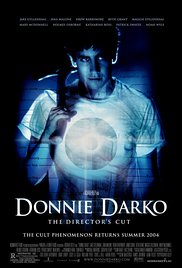
DONNIE DARKO
US, 2001, 113 minutes, Colour.
Jake Gylenhaal, Jena Malone, Mary Mc Donnell, Maggie Gylenhaal, Daveigh Chase, Holmes Osborne, James Duval, Patrick Swayze, Beth Grant, Seth Rogen, Noah Wyle, Drew Barrymore, Katharine Ross.
Directed by Richard Kelly.
Writer-director, Richard Kelly, made this apocalyptic comedy-drama of suburbia and madness when he was 26. For those looking for an anchor in American cinema, Blue Velvet might be a suggestion. This film has eerie reminders of the work of David Lynch, especially in his use of parallel worlds. Donnie is played with a mixture of innocence, cunning and eruptive violence by Jake Gylenhaal (October Sky, Lovely and Amazing). He is told by his imaginary friend, Frank (who appears dressed as a giant rabbit) that the world is to end in 28 days. In the countdown, many bizarre things happen, especially the flood in Donnie's school, the burning down of a motivation guru's (Patrick Swayze) mansion, encounters with an old lady called Grandma Death and friendship with a girl (Jena Malone) whose father stabbed her mother. In the meantime Donnie sees his therapist (a rare screen appearance by Katharine Ross) and explains his moods and paranoid schizophrenic behaviour to her - and to us.
While the film takes us into the mood swing world and the imagination of the schizophrenic, it is also placing it in the context of the nice average American town, the pleasant family (presided over with sensitivity and vulnerability by Mary Mc Donnell), the generally well-run High School (where Drew Barrymore and Noah Wyle are teachers). But, of course, things are not so nice beneath the surface, with some thug students, the motivation guru exposed as a child porn publisher, the coach of the young girls' dancing ensemble being a campaigner against reading Graham Greene in the school, but sacrificing herself for the counsellor with whom she is infatuated.
In fact, there are so many themes in the film that it sometimes seems too much for mus to take in and deal with in the two hours. Nevertheless, there is a vitality about the film that keeps it in the memory. (Leslie Halperin, reviewing Donnie Darko in Sight and Sound explains that Richard Kelly edited the film from a far more obvious story where Donnie was not mentally ill, where there more explicit religious references, to its present more enigmatic cut: in keeping with the spirit of the film, there are parallel versions.)
1. The status of the film ? And its release? The status? The director? The initial position – and the conditions and the director’s cut?
2. The Americans, the streets, houses, school, parties,, the musical score?
3. The cast, to Gillian will, the supporting cast? The director and his status?
4. The mental health, schizoid paranoia, voices, visions, visions and ends, believing the visions and voices, the imagination, the particular worldview, apocalyptic, the touch of the comic, the creatures? Ordinary, medication,, confronting the psychological state?
5. The portrait of the ordinary family,, job, relaxing, the family, the daughters recital? The mother, tearing, following a dialogue despite himself, going to supervise in Los Angeles? The daughter, her age, laughing at things, partnership, education? Sam, at school, training in movement, the performance, going to Los Angeles?
6. Donnie, his age, life so far, at school, the interaction with the teachers, the literary teacher and the empathy, her telling him the phrase, cellar doors? The sympathetic science teacher, listening to the theories about time travel, holes? The principal, severity? The range of students, the Chinese girl and reactions to at the school, Chinese, flat? The top students and their bullying? Frank? The party? My load, meeting her, nice, the kiss, the story of her parents and stabbing, going to see the Evil Dead and sleeping through it?
7. The hallucinations, the end of the world, belief, the captions for the number of days left? Frank and disappearing, size, the rabbit mask, appearance, giving information, the commands, destructive commands, the water main and the flooding of the school? Swayze and the burning of his house, and the revelation of his secret rooms? The vision of the air and?
8. The therapist, her sessions, sympathy and empathy, listening, don is responding, her hypnotising him, the revelations under hypnosis? The important phone call of warning?
9. Drew Barrymore as the literary teacher, Graham Greene story? Teaching, Simon by the principal, the discussions, her being fired, the animosity of the teacher who taught movement? Cellar door? You were while as the science teacher, the talks, sympathy, time travel, reluctant to continue the discussions?
10. Malone, meeting, personal, have liking for Donnie, going to the party, the encounter together, his wanting to save her?
11. Frank’s real, as an parishioner? His appearing, the bullying friends, the shooting?
12. The teacher with the little girls, movement, her horrified reaction to literature, the attack on pornography, her admiration that Jim Cunningham, his tapes and screening them, his attitudes? Patrick Swayze as Cunningham? His talk, the questions, the children on stage, developing a positive approach? Donnie, his asking a question, his attack, Cunningham’s reaction? The burning his house, the revelation of his pornography, the news in the papers, the teacher and her wanting to thinking, believing him innocent?
13. Donnie, the strength of his dreams, the best dreams, self-aware, relating to reason a world?
14. The episode with the bomb, the effect on the house, Donnie at the golf links and missing it?
15. The recapitulation, his dream as he died, Donnie is dead, Malone and her not knowing him, passing by, talking with a little boy, the wave to the mother, the parents grief?
16. The director’s cut had additional sequences – which some thought effective and others thought added unnecessarily?
17. And experience of the early 2000’s, American life, American attitudes, mental illness? The apocalyptic tone?